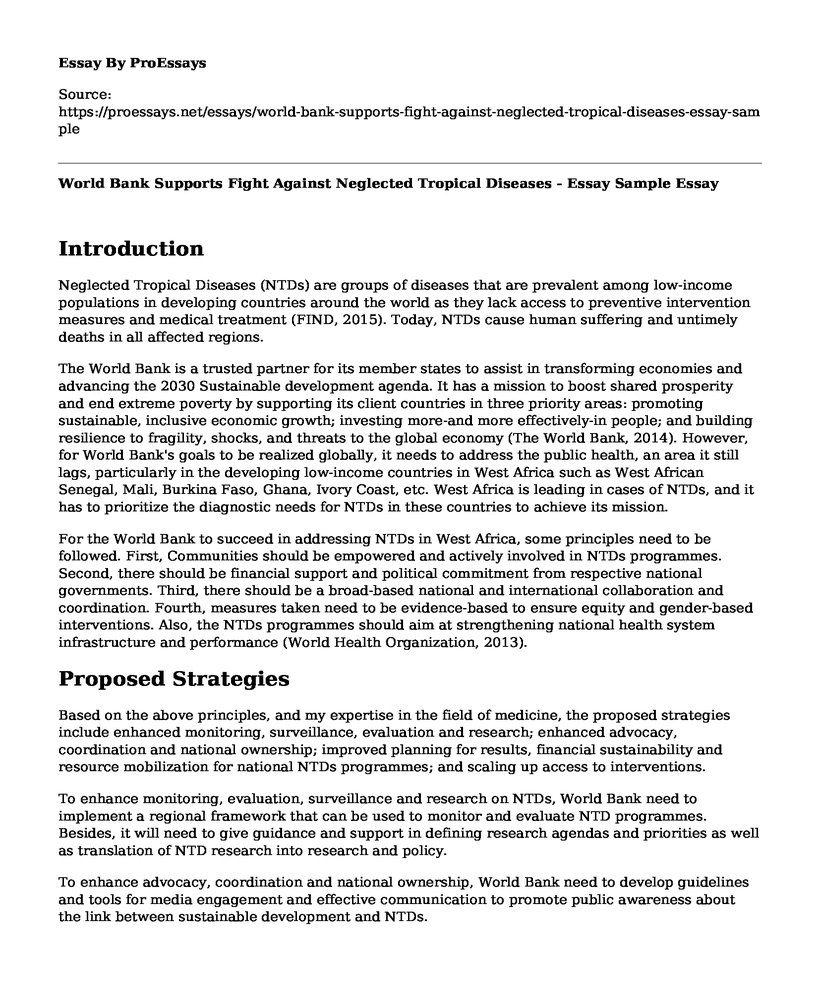Introduction
Neglected Tropical Diseases (NTDs) are groups of diseases that are prevalent among low-income populations in developing countries around the world as they lack access to preventive intervention measures and medical treatment (FIND, 2015). Today, NTDs cause human suffering and untimely deaths in all affected regions.
The World Bank is a trusted partner for its member states to assist in transforming economies and advancing the 2030 Sustainable development agenda. It has a mission to boost shared prosperity and end extreme poverty by supporting its client countries in three priority areas: promoting sustainable, inclusive economic growth; investing more-and more effectively-in people; and building resilience to fragility, shocks, and threats to the global economy (The World Bank, 2014). However, for World Bank's goals to be realized globally, it needs to address the public health, an area it still lags, particularly in the developing low-income countries in West Africa such as West African Senegal, Mali, Burkina Faso, Ghana, Ivory Coast, etc. West Africa is leading in cases of NTDs, and it has to prioritize the diagnostic needs for NTDs in these countries to achieve its mission.
For the World Bank to succeed in addressing NTDs in West Africa, some principles need to be followed. First, Communities should be empowered and actively involved in NTDs programmes. Second, there should be financial support and political commitment from respective national governments. Third, there should be a broad-based national and international collaboration and coordination. Fourth, measures taken need to be evidence-based to ensure equity and gender-based interventions. Also, the NTDs programmes should aim at strengthening national health system infrastructure and performance (World Health Organization, 2013).
Proposed Strategies
Based on the above principles, and my expertise in the field of medicine, the proposed strategies include enhanced monitoring, surveillance, evaluation and research; enhanced advocacy, coordination and national ownership; improved planning for results, financial sustainability and resource mobilization for national NTDs programmes; and scaling up access to interventions.
To enhance monitoring, evaluation, surveillance and research on NTDs, World Bank need to implement a regional framework that can be used to monitor and evaluate NTD programmes. Besides, it will need to give guidance and support in defining research agendas and priorities as well as translation of NTD research into research and policy.
To enhance advocacy, coordination and national ownership, World Bank need to develop guidelines and tools for media engagement and effective communication to promote public awareness about the link between sustainable development and NTDs.
To improve planning for results, financial sustainability and resource mobilization for national NTDs programme, World Bank will need to offer support to client members to mobilize internal and external resources towards NTD programmes through donations and funding meetings. It will also be necessary for annual meetings with NTD managers to review NTD plans. Besides, it will need to create a system that can be used to track financial contribution to the NTD programmes.
Finally, to scale up access to interventions, which is a significant concern, World Bank will need to develop trainers' module on Preventive Chemotherapy (PC), Transmission Control (TC), and Case Management (CM). It will also need to ensure regular supplies for interventions, including diagnostic tools and medicines.
Effective implementation of the above strategies will not only enable West African countries to reduce and eliminate NTDs but also contribute to the World Banks mission of transforming economies and advancing the 2030 sustainable development agenda.
References
FIND. (2015). Strategy for neglected tropical diseases 2015-2020. Retrieved from: https://www.finddx.org/wp-content/uploads/2016/02/NTD_Strategy_WEB.pdf
The World Bank. (2014, March 27). The World Bank and neglected tropical diseases: building on a history of helping countries address diseases of the poor. Understanding Poverty. Retrieved from: https://www.worldbank.org/en/topic/health/brief/world-bank-neglected-tropical-diseases-building-on-history-of-helping-countries-address-diseases-of-poor
World Health Organization. (2013). Regional strategic plan for neglected tropical diseases in the African region 2014-2020. Retrieved from: https://www.afro.who.int/sites/default/files/sessions/documents/afr-rc63-10-add-en.pdf
Cite this page
World Bank Supports Fight Against Neglected Tropical Diseases - Essay Sample. (2023, Jan 16). Retrieved from https://proessays.net/essays/world-bank-supports-fight-against-neglected-tropical-diseases-essay-sample
If you are the original author of this essay and no longer wish to have it published on the ProEssays website, please click below to request its removal:
- Essay on Body Cameras on Police Officers
- Asthma in Hispanic Children Essay Example
- Essay Sample on the Interrelationship Between Theory, Knowledge, and Research and Evidence-Based Practice (EBP)
- Child Abuse and Neglect in New York City - Essay Sample
- Essay Sample on Nursing Researchers: Uncovering Validity and Relevancy in Studies Using PICOT
- Creating a Supportive Environment for Disabled Children - Essay Sample
- Free Report on Cystic Fibrosis Care: Resources, Interprofessional Teams, and Therapeutic Communication







